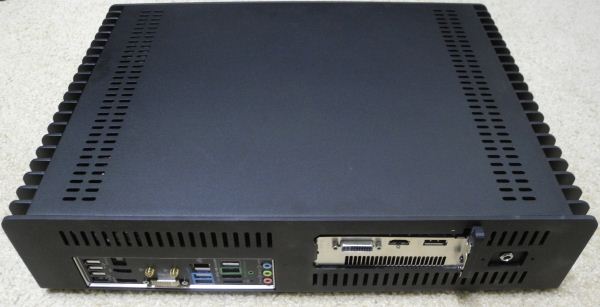Streacom's FC10 and Nano150: Building a Fanless Ivy Bridge HTPC
by Ganesh T S on December 22, 2012 3:30 AM EST- Posted in
- HTPC
- Fanless
- Ivy Bridge
Concluding Remarks
Building a passive system might be more challenging compared to assembling an actively cooled one. However, the satisfaction of seeing a PC up and running without making even the slightest noise has to be experienced to be appreciated. The assembly of the Streacom FC10 was made more challenging than necessary, thanks to the faulty user guides uploaded initially. However, Streacom has fixed the problem now, and they have also posted a system builders guide for customers of their fanless cases. If one were to nitpick, it would be the PCIe slot spacing (which may leave some users with no option but to do a case mod) and the fact that only pico-PSUs are supported. The chassis could have been designed to accommodate a full-sized PSU (some excellent relatively high power fanless options are available from Seasonic) given that the current version is sized to even accept ATX motherboards.
We have used the Streacom FC10 chassis and the Nano150 PSU to successfully build a completely silent HTPC. In the next part of the three-part series, we will look at the performance of the PC for general workloads (synthetic benchmarks) and also its suitability for HTPC purposes (including decoding and rendering benchmarks as well as network streaming performance).
Thank You!
Thanks to Streacom, Perfect Home Theater, Asus, G.Skill and Intel for providing us with the testbed components for our three-part HTPC series.











63 Comments
View All Comments
wsaenotsock - Saturday, December 22, 2012 - link
As much as I appreciate the whole full-silent chassis by Streacom here, and others such as Zalman- who made a high end one a few years back... I don't understand why there aren't more cases that are designed like this while also incorporating low-volume air cooling with a large sized, high quality fan, slightly undervolted. Widely tested & recommended fans (such as on the SPCR website) are barely detectable and add enough airflow to keep the temperatures manageable, so that you can actually use performance components, not just end up cornered into low wattage HTPC stuff, and still not worry about reducing lifespan of parts with heat.I want to see more cases that are intelligently designed instead of just fully passive or the opposite extreme with 5 - 8 120mm fan cutouts.
snuuggles - Saturday, December 22, 2012 - link
Took the words out of my mouth. I wonder if it's that HT stuff simply "should" be under a certain heat envelope so they play nice with all the other components they are stacked up with traditionally?I mean, there's a reason most stereo stuff doesn't come with a fan of any kind.
PS did you see the new type of "bellows" fan being developd
Menty - Saturday, December 22, 2012 - link
Absolutely. Fully passive cases just make too many compromises when one or two very very slow fans will make everything just that much happier.LauRoman - Saturday, December 22, 2012 - link
Problem is, very slow fans get dust clogged and louder as time goes on. On a machine that will barely be touched by fingers, let alone opened-up that's not a very good thing.Olaf van der Spek - Saturday, December 22, 2012 - link
Isn't that why dust filters were invented?EnzoFX - Saturday, December 22, 2012 - link
Still requires maintenance.Hrel - Sunday, December 23, 2012 - link
you sound like a horrible person. You can't be bothered to clean your PC once/year? Slob.Samus - Monday, December 24, 2012 - link
yep. coolest thing about passive cooling is you can open it up 3 years later and it still looks brand new inside without a spec of dust!mike8675309 - Thursday, December 27, 2012 - link
Someone hasn't opened up his T.V., or stereo, or cable box lately.kmmatney - Tuesday, January 22, 2013 - link
I bought my Kenwood receiver (still used with my TV) in 1989, and cleaned it out for the first time about 2 years ago. So yeah, you have to clean it out, but only every 20 years or so. That said, I'd prefer a slow moving fan in an HTPC case.